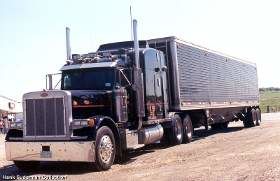Thinking About Starting My CDL Training With PAM Transport
Topic 2166 | Page 1

I'm seriously considering PAM as well. I am initially suppose to go to Celadon, but, am uneasy. i am hoping for great tips here, as well. Aug 25 will not be here soon enough

I've been driving for PAM for 8 months now. What would you guys like to know?

Is the company great to work for? I know their training perks sound good. Yes I have to pay a little up front, but, for what I have to pay, it is almost like they are reimbursing me. I like the $1200 sign on bonus. Is there forced dispatch? Are they good about getting you home?

Tracy, I won't try to make things sound better than they are, because I think you will be much better off, going into this knowing what to expect.
Are they a great company to work for? Well, it is difficult for a training company to be great to work for, because they have to be self insured. Translated, what self insured means, is that when a driver wrecks a truck, PAM pays for all the damages out of pocket. How do they offset the costs of this? They pay the drivers a very low wage if they stay solo, which encourages them to drive team if they want to make any money. This is much better for PAM, because they make a whole lot more money when the truck runs as a team. There is a very high attrition rate at all levels of training, so the company has to recoup their money the best they can.
Some of the trailers you pick up will be damaged. If it is minor damage, you will have to call in and report it. If it is serious enough, you will have to take it to a shop to get it fixed before you can pull it, to the shipper. It's just the nature of working for a training company and paying your dues the first year. Think of it as a test. Once you make it through your first year and have a solid year of driving behind you, you can go to work for a company whose drivers don't damage near as many trailers, so you won't have to deal with those issues as often.
If they owe you maintenance layover pay, layover pay, or need to reimburse you for something you bought, it is up to you to ask them for a purchase order and express code, so you can cash a comcheck at one of the truck stops. If you fail to ask them for a PO number and express code, you won't get paid that money. The money that they owe you per mile is automatically paid, as long as you transflow in all your Bill Of Ladings at the truck stop. You can't expect your driver manager to make sure you get the money that is coming to you, unless you stay on top of it and ask them.
Is there force dispatch? Well for the most part yes. I got a load once to New York City, and wasn't real excited about it. I called my DM and told them I wanted out of there before I wrecked the truck, so they got me a load that would take me west. I told them they needed to find someone with more experience to go to New York with a 53 foot trailer, because that is what doubles are for. Except for that situation, I didn't want to turn down any loads, because as they say "If the wheels aren't turning, you're not earning."
Are they good about getting you home on time? Only if you put your foot down and refuse a load when you know that it is going to interfere with you getting home on time. They would like to keep you out there 7 or 8 weeks at a time, but I always have either a doctors appointment or a dentist appointment once a month, so that puts leverage on them to get me home on time. Out of the 8 months I have been driving, I got home once on time, once a day early, and the rest of the times I got home about 4 or 5 days late. They will test you to see just how much you will put up with, and what your breaking point is, because everyone has a breaking point.
I had a driver manager who asked me to run a load overweight that I already had scaled and couldn't adjust out my tandems because it was too heavy overall. I got rid of him and requested another driver manager, but after a few weeks they transferred my new DM to a new parts lane, and put me back with the other guy. Right off the bat he askes me to pull a trailer with a load that has shifted and broken almost all the hinges off the doors of the trailer. I refused to run it, and told him it was another DOT violation. It will be necessary to know the law and stand your ground when you are asked to violate DOT regulations.
This is a lot like prospecting for a motorcycle club or pledging a fraternity. They are going to try to push your buttons, and try to get you to quit. They like to see how much you will take, because if you take a lot, they will put more difficult loads on you. If you can hold out for at least 6 months, you can find another reputable company who won't put you thru as much, but then again, some of the situations you will have to go thru from time to time with any company. The difference is, that if you are making 50,000 a year instead of 15,000 a year, the "challenges" are much easier to justify for the money.
Having said all that, I will tell you that I feel like I don't have to work anymore since I started driving a semi. Compared to my old welding job, this one is super easy physically, but it can be very stressful in some situations. Probably only 30% of the driving public respect truck drivers and treat them with courtesy. Some days are better than others.
If it sounds like I am not happy or ready to quit, nothing could be farther from the truth. I have just now made it far enough to go to work for a non training company, and reap the rewards.
I hope I haven't discouraged you, but instead I hope I have mentally prepared you for what is to come. Compared to years of college or the time it takes to break into other fields, 24 to 52 weeks of paying your dues in the trucking industry really isn't all that bad. The trucking companies have a lot of liability, and some of the drivers they are hiring fall somewhere between Rainman and Forrest Gump, but they never know who is who until they give the driver a chance.
Shipper:
The customer who is shipping the freight. This is where the driver will pick up a load and then deliver it to the receiver or consignee.
Tandems:
Tandem Axles
A set of axles spaced close together, legally defined as more than 40 and less than 96 inches apart by the USDOT. Drivers tend to refer to the tandem axles on their trailer as just "tandems". You might hear a driver say, "I'm 400 pounds overweight on my tandems", referring to his trailer tandems, not his tractor tandems. Tractor tandems are generally just referred to as "drives" which is short for "drive axles".
Tandem:
Tandem Axles
A set of axles spaced close together, legally defined as more than 40 and less than 96 inches apart by the USDOT. Drivers tend to refer to the tandem axles on their trailer as just "tandems". You might hear a driver say, "I'm 400 pounds overweight on my tandems", referring to his trailer tandems, not his tractor tandems. Tractor tandems are generally just referred to as "drives" which is short for "drive axles".
DOT:
Department Of Transportation
A department of the federal executive branch responsible for the national highways and for railroad and airline safety. It also manages Amtrak, the national railroad system, and the Coast Guard.
State and Federal DOT Officers are responsible for commercial vehicle enforcement. "The truck police" you could call them.
Doubles:
Refers to pulling two trailers at the same time, otherwise known as "pups" or "pup trailers" because they're only about 28 feet long. However there are some states that allow doubles that are each 48 feet in length.
Dm:
Dispatcher, Fleet Manager, Driver Manager
The primary person a driver communicates with at his/her company. A dispatcher can play many roles, depending on the company's structure. Dispatchers may assign freight, file requests for home time, relay messages between the driver and management, inform customer service of any delays, change appointment times, and report information to the load planners.Driver Manager:
Dispatcher, Fleet Manager, Driver Manager
The primary person a driver communicates with at his/her company. A dispatcher can play many roles, depending on the company's structure. Dispatchers may assign freight, file requests for home time, relay messages between the driver and management, inform customer service of any delays, change appointment times, and report information to the load planners.HOS:
Hours Of Service
HOS refers to the logbook hours of service regulations.OWI:
Operating While Intoxicated
EPU:
Electric Auxiliary Power Units
Electric APUs have started gaining acceptance. These electric APUs use battery packs instead of the diesel engine on traditional APUs as a source of power. The APU's battery pack is charged when the truck is in motion. When the truck is idle, the stored energy in the battery pack is then used to power an air conditioner, heater, and other devices

Great info Dutch. Thanks. I'm currently processing my app with PAM. If I can handle 22 years in the Army, this will be no big deal. I've researched too many companies and just nailed it to one ( VA OJT is offered too). This post was last year, but if you're still with PAM let me know. Take er easy.

Great info Dutch. Thanks. I'm currently processing my app with PAM. If I can handle 22 years in the Army, this will be no big deal. I've researched too many companies and just nailed it to one ( VA OJT is offered too). This post was last year, but if you're still with PAM let me know. Take er easy.
Disco, that attitude is exactly what you will need to possess, because adapting and overcoming will be needed from time to time.
After working for PAM for 8 months, I am now working for Crete Carrier making 45 cents per mile. On a bad week, I take home $650, on a good week I take home $1000, and I am single with no dependents. Try to stay accident free with PAM, and with 6 months experience Crete will be willing to consider you and bring you on over to their team. Good luck and stay focused on the big picture long term.
I have just now made it far enough to go to work for a non training company, and reap the rewards.
Let me be clear about something. This idea that "training companies are only starter companies" is complete BS. Most of the companies I worked for throughout my career were training companies. Many of the best companies in the nation are training companies.
Companies that train drivers tend to be the largest companies with the longest tenure. They tend to have great equipment, great financing behind them, and tons of various opportunities in different divisions.
The last OTR company I worked for was US Xpress and I was there for the better part of 6 years. They trained drivers throughout the years I worked there. They had immaculate equipment, tons and tons of different divisions to choose from, great pay, solid home time, and treated you very well.
Well, it is difficult for a training company to be great to work for, because they have to be self insured. Translated, what self insured means, is that when a driver wrecks a truck, PAM pays for all the damages out of pocket. How do they offset the costs of this? They pay the drivers a very low wage if they stay solo, which encourages them to drive team if they want to make any money
I'm afraid that's not only over-simplified, but highly inaccurate. Prime is a training company and they start you at over 40 cents per mile, have beautiful equipment, treat you really well, and let you run solo after training.
PAM may not be up to par with some of the other companies when it comes to their pay and equipment, but it's not because they're a training company. It's because that's the way they're running their company. So don't get the idea that companies who offer training are second class citizens. That's not true at all.
CDL:
Commercial Driver's License (CDL)
A CDL is required to drive any of the following vehicles:
- Any combination of vehicles with a gross combined weight rating (GCWR) of 26,001 or more pounds, providing the gross vehicle weight rating (GVWR) of the vehicle being towed is in excess of 10,000 pounds.
- Any single vehicle with a GVWR of 26,001 or more pounds, or any such vehicle towing another not in excess of 10,000 pounds.
- Any vehicle, regardless of size, designed to transport 16 or more persons, including the driver.
- Any vehicle required by federal regulations to be placarded while transporting hazardous materials.
OTR:
Over The Road
OTR driving normally means you'll be hauling freight to various customers throughout your company's hauling region. It often entails being gone from home for two to three weeks at a time.
OOS:
When a violation by either a driver or company is confirmed, an out-of-service order removes either the driver or the vehicle from the roadway until the violation is corrected.

Brett, I certainly wish that I had the same experience you did with U.S. Express, but at least my first year is all behind me now.
I know a few drivers who have stayed with companies with lower pay, simply because they have something on their record preventing them from going to work somewhere else. Also, sometimes they accept the lower pay because they are getting a dedicated type run that gets them home more frequently, and they are afraid if they go to work somewhere else for more money, they will be out much longer.
I suppose the term "training company" should simply be applied to those companies who train, since there are some companies who require many years of experience before they will consider a driver. Certainly there are drivers who continue to drive for less money, but there is usually a reason keeping them there in addition to the pay.
I was told that companies who hire new drivers get government subsidies AFTER a driver leaves the company. If that is true, I can see why some companies might not get too concerned about a driver leaving, especially if they have plenty more coming down the assembly line. I have no way to verify this, so I can't say I know it to be true for certain, just some info I have heard from multiple drivers.
The company I work for now pays much more than the first company I drove for, and some people wonder what is the catch. IMO, it seems that the main difference is that they try to run us 3000 miles a week, and some drivers don't like to run that hard. On the other hand, some drivers state that if they can't get at least that many miles, they need to drive elsewhere. It all comes down to finding a company where a driver "fits," and likes the overall balance of perks vs. pay vs. negatives.
What ever strategy "training companies" decide to use to run their company, you can be sure it is one that makes them a profit they can stay in business with, and there is always more than one way to skin a cat.
HOS:
Hours Of Service
HOS refers to the logbook hours of service regulations.New Reply:
New! Check out our help videos for a better understanding of our forum features

















Preview:
This topic has the following tags:
PAM Transport Advice For New Truck Drivers Choosing A Trucking Company Life On The Road







 TT On Facebook
TT On Facebook
Can anyone give me any information on PAM Transport?
CDL:
Commercial Driver's License (CDL)
A CDL is required to drive any of the following vehicles: